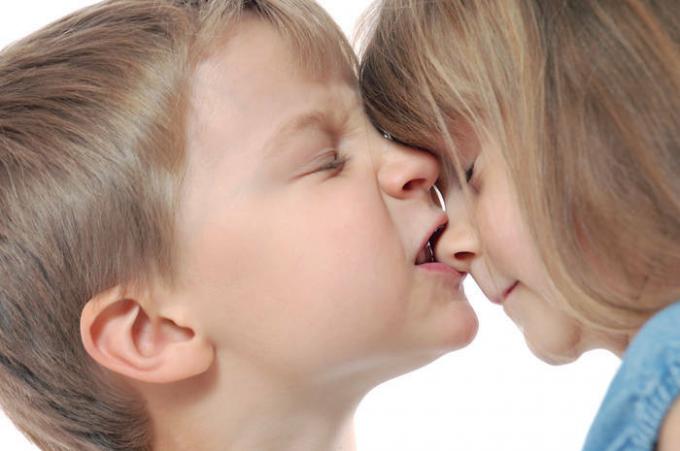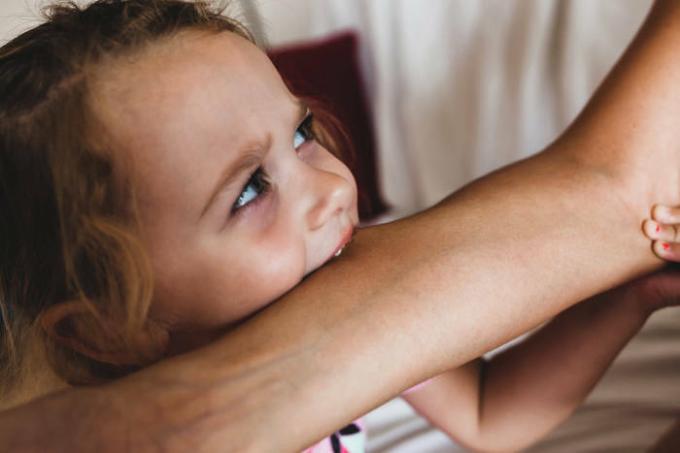In a children's team, kids often bite each other. This happens occasionally, during an active game or for experimental purposes. However, it happens that in a group of children a systemic "biter" appears, which "shows teeth" constantly and does it very painfully. This is unpleasant for the parents of bitten children, and doubly unpleasant for the parents of a "toothy" baby. The latter immediately begin to suspect that their child has increased aggression, communication problems, or worse, with mental health.
In fact, biting is a natural stage in the knowledge of the world. All children at an early age bit their mother during breastfeeding, tried rattles on the tooth, bit parents while playing. Most babies outgrow this stage as soon as all their teeth erupt. But for some, the craving for biting persists until school age. According to psychologists, there is a deep reason for this: the so-called "positive reinforcement" that the child once received after biting. Simply put, if the baby, having bitten his mother, gets what he wants (for example, draws her attention to himself) - this is fixed in his head as a way to achieve the goal.
That is why punish "Biter" is physically impossible. Thus, the parents instill fear in the child, oppress, but in no way discourage the desire to bite. This desire remains hidden, and torments the baby, because he is forced to look for himself how and what to replace biting. It will be much more effective to try to understand the reasons: why the child bites in a given situation. Once the cause is found, it is easier to suggest an alternative action. Little by little, the "positive reinforcement" effect of biting will fade away, and the child will wean the bad habit.
Reason 1. The child asserts itself through biting

In a children's team, kids gain leadership through biting / istockphoto.com
Leaders in the team do not appear in schools, the struggle for leadership starts already in kindergarten. If your child wants to be the first everywhere, he will gain authority in the ways available to him. Often this happens through biting: this is how the baby tries to prove his strength and subjugate other children.
What to do: Explain that the bite will not work. "Kusaka" not only will not become a ringleader, but risks being left without any company at all. Teach him other forms of leadership: for example, offer joint games, protect the weak. If we are talking about a kindergarten, you can offer the child to become a teacher's assistant for a while.
Reason 2. The child is stressed and anxious.
Biting is a common problem in the new children's community. In an unfamiliar environment, even the most sociable children experience stress. And if the child is quiet, calm and uncommunicative, anxiety in a new place can go off scale. In such a situation, the child bites like a small animal - trying to protect himself from unknown, but quite real dangers in his head.
What to do: If the reason for biting is fear or stress, parents should pay more attention to emotional contact with the child, give him even more care and love than before. In kindergarten, at the same time, you need to talk with the teacher: he must help the baby to adapt. Perhaps it is necessary to introduce the child to other children, at the first stage even to “find” a couple of friends for him. You can also define a corner where the child will be comfortable and safe.
Reason 3. The child is very emotional

Children can bite even from the fact that some of their friends really like them / istockphoto.com
There are children who are sharply categorical in their emotions. They have either black or white, or good or bad. The feelings of such guys can be compared to a wave that rolls over suddenly and covers completely. It's not only about an explosive character, a wave of emotion can also be positive - for example, I really liked the toy, or a lot of joy about the gift. These children find it difficult to cope with their feelings, because they can bite to give vent to emotions.
What to do: Teach your child to express their emotions in a different way. If this is a delight, let him jump. If the feeling of "universal love" - allow hugging and kissing. If aggression - give the right to shout and stamp your feet. Do not be afraid that the child will grow up unrestrained: later you will teach him to replace expressions of emotion with words. In the meantime, the task is to wean him from biting, let him express feelings with the strength with which he is comfortable.
Reason 4. The child lacks attention
This is exactly the case that goes back to deep childhood, when the baby bit mother's breast, receiving an attentive look or smile in return. Children who experience lack of attention, actively use bites in the kindergarten and on the site. Indeed, in this way, they, albeit for a short time, become the center of events and common interest.
What to do: Increase the presence in the child's life to the maximum possible. Hug, kiss, communicate as much as time allows you. Try to establish emotional contact - then after a while you will clearly track the moments when the baby wants to "show his teeth." If a child bites, in no case focus on this, and do not inflate the situation to a problem of a universal scale - after all, this is exactly what he unconsciously strives for. Explain that it is painful and unpleasant, and be defiantly offended. Let the child understand that due to the bite, on the contrary, attention can be lost.
Reason 5. The child saw a negative example

When a child starts to bite, he always notices the reaction of adults / istockphoto.com
Children repeat one after another, like little monkeys. Therefore, when biting, your child may well copy a friend or companion in the garden. Especially if at the same time he noticed that the bite leads to some interesting result. For example, a friend bit another child and received his toy. Such tools for achieving goals are adopted from the first time. And after a couple of days, the child bites not only in the garden, but also at home.
What to do: Find out from the teacher if there is a "contagious example" in the kindergarten. If your baby is copying someone, you need to wean both children from biting. Explain to your child that a bite does not work as an achievement. It might be worth role-playing with him. For example: I have a toy, try to get it. If the baby begins to bite, show how you can achieve what you want in other ways (ask, change, wait, offer to play together).
You will also be interested in reading:
Alarm bells: 5 signs your child lacks attention
What to do if a child fights in kindergarten
A child fights and bites: 5 tips on how to survive a crisis 3 years




